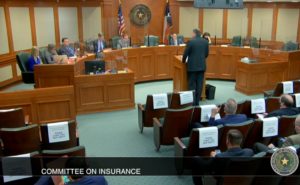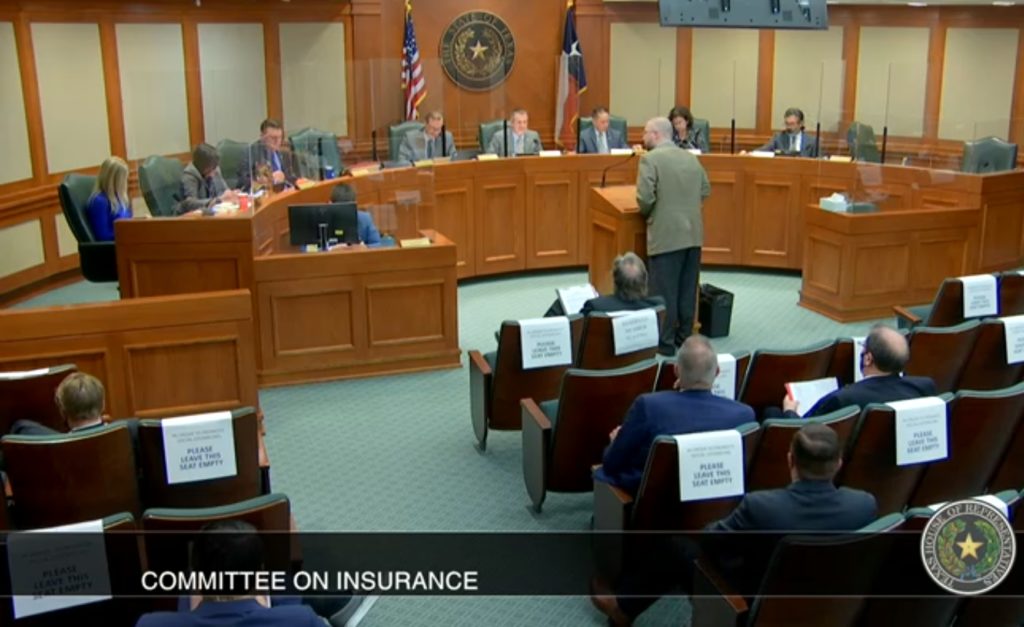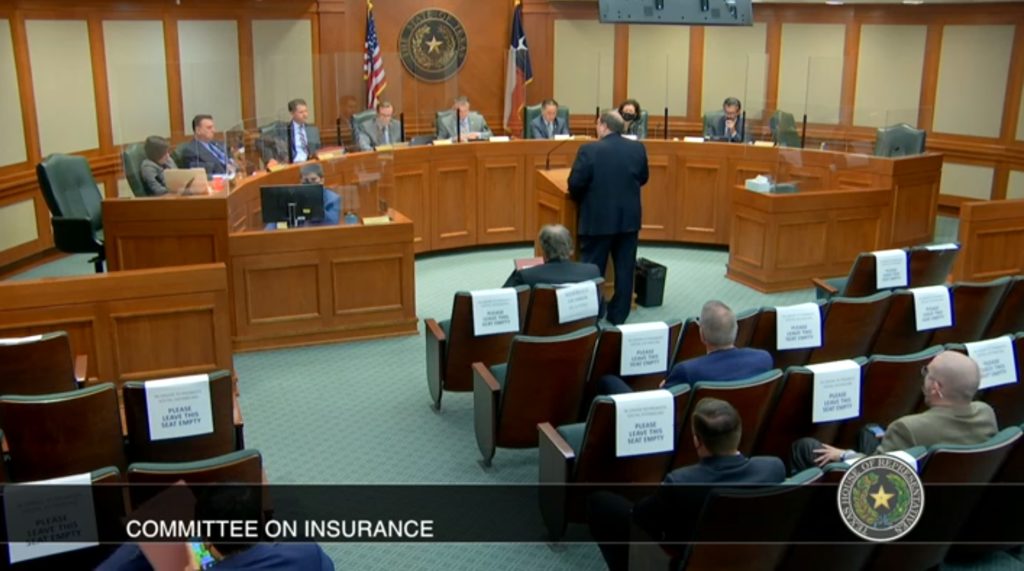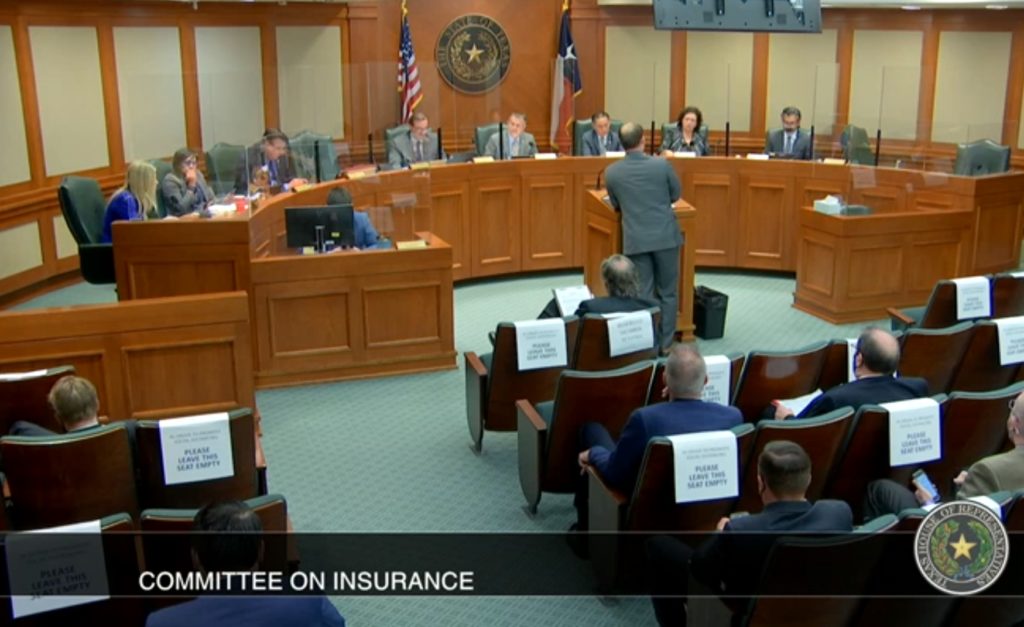
UPDATE: Tex. House committee backs mandatory ‘loser pays’ auto insurance appraisal clauses
By onAnnouncements | Market Trends | Repair Operations
The Texas House Insurance Committee on Tuesday voted 5-4 to recommend fellow lawmakers pass a bill mandating appraisal clauses in auto insurance contracts.
House Bill 2534 would institute another option for insurers and policyholders to resolve claim cost disputes without having to go to court. It would allow either side to exercise a right to appraisal to determine the amount an insurer should reimburse on a repair bill or a totaled vehicle.
Appraisal clauses
If the right-to-appraisal process produces a total loss or repair cost valuation $1 higher than the insurer’s last offer, the insurer must pay the customer’s appraiser fees and expenses. If the insurer’s last offer was deemed “just,” House Bill 2534 would have the customer pay the insurer’s appraiser fees and expenses. (For a little context, public adjuster Robert McDorman, general manager of Auto Claim Specialists, told lawmakers an appraisal at his firm typically costs $800.)
The umpire’s fees and expenses would still be split equally between both sides. (Auto Body Association of Texas Vice President Eric McKenzie told us earlier this year that in his experience, most RTAs are able to be resolved without paying for an umpire.)
As sponsoring Rep. Travis Clardy, R-Nacogdoches, put it during an Insurance Committee hearing April 20: “Loser pays.” (The hearing on HB 2534 can be viewed here. It begins at about 1:58.27.)
The bill, which cleared the committee without amendments, would otherwise require a fairly standard version of the right to appraisal concept in all personal auto policies. The “loser pays” concept is the only major distinction; appraisal clauses often leave both sides responsible for their individual costs and split the umpire bill.
If the insurer and customer can’t agree on the amount the carrier owes in a loss, HB 2534 would allow either party to invoke their right to appraisal within the first 90 days after a claim’s filing.
Both sides need to hire a “competent appraiser” within 15 days of the appraisal clause being exercised, and those appraisers must “determine the amount of loss.”
If the two appraisers can agree on a dollar value, that amount will be binding. If they can’t agree, then the appraisers work together to choose an “umpire.” If they can’t agree on an umpire within 15 days, the insurer or policyholder “may request that a court in the county in which the named insured resides select the umpire.”
The umpire under HB 2534 also “shall determine the amount of loss.” If either appraiser agrees with the umpire, then that amount is binding.
Clardy called it an opportunity for an “amicable resolution” to a total loss or repair bill dispute and an “alternative path to lawsuits.” He said the loss would be calculated by “unbiased professionals.”
Representatives for the National Association of Mutual Insurance Companies and the American Property Casualty Insurance Association both opposed the bill. However, Clardy said appraisal clauses were established in state code more than 15 years ago at the request of insurers.
“What’s good for the goose should be (good) for the gander,” he said.
“It’s the carriers who wanted appraisal put in the policies,” bill supporter Ware Wendell, executive director of Texas Watch, told lawmakers. Wendell indicated it was a bit of a role reversal: He was pushing for appraisal on behalf of consumers, while the insurance industry argued, “‘Wait a second, wait a second. Let’s not do this,'” he said.
Gap insurer in favor
One insurer did support the measure.
Gary Vucekovich, president of gap insurance vendor ForeSight Services Group, said “in a perfect world,” the primary insurer would pay the cash value of a totaled vehicle, and the gap provider would cover whatever remaining amount the motorist owned their lender.
“The customer walks away with no further financial obligation for the totaled vehicle,” he said.
However, “we don’t live in a perfect world,” Vucekovich said. He asked the Insurance Committee members to pretend they were a consumer notified that their vehicle had been totaled. After the primary insurer and gap insurer settle the claims, the lienholder reports $1,500 is still due — even though the consumer bought “two levels of coverage” to prevent this.
One would “naturally be upset,” Vucekovich said.
He said ForeSight had been involved with more than 300 conference calls including a primary insurer and a customer. “I can’t think of one that went well,” he said.
No “Perry Mason moment” exists where one side suddenly declares they’ll pay the bill, according to Vucekovich. “We defend our contracts,” he said. Each tries to stick the other with the check.
“The insured is the one squeezed in the middle,” he said.
That was about 10 years ago. For the past 2.5 years, Vucekovich said, he’s implemented a strategy that would make a consumer “much happier.”
“The only way to make the customer whole is to refer them to a licensed public insurance adjuster to determine the actual cash value of a vehicle,” Vucekovich said.
Now, either the primarily insurer pays the disputed difference or the gap insurer does. “Solved it,” Vucekovich said.
He said that 24 out of 25 disputes during the past 2.5 years have seen the primary insurer proved wrong about their initial cash valuation and owing the consumer more for the car.
“I like those odds,” Vucekovich said.
He said that he refers customers to their policy, which hopefully contains an appraisal clause — and many do, he said.
“Please make the appraisal clause mandatory to protect the insured,” Vucekovich said.
Insurer estimates found low
APCIA state government relations Vice President Joe Woods opposed the bill on the grounds it would increase insurance premiums. The insurer’s amount would always come up short, he argued.
“The appraisal process is about finding that number above what the company offered and below what the claimant asked for,” he said.
In most disputed insurance claims, “appraisal’s not an issue,” Woods said. Negotiations are held over a difference of several hundred dollars, and “the claim is paid.”
But under HB 2534, policyholders would have a “hammer,” Woods argued. An insurer only short by $1 could wind up paying $1,200-$1,500 over a $500 disagreement, he said.
Insurers arguably have their own hammer in this regard. The expense of a traditional “each side pays their own costs” appraisal clause could disincentivize consumers from using the process on certain claims, or even at all. The automotive repair lender DigniFi recently argued that most Americans don’t have an extra $500-$600 for unexpected expenses. In theory, an unethical insurer could lowball claims with impunity.
McKenzie told us he’s “not ever” seen an instance where the traditional appraisal clause process didn’t award a higher amount than the insurer’s last offer.
McDorman said the appraisal process in his experience has found insurers’ original offers had underindemnified policyholders by 35 percent on average. Routinely, insurers have written an estimate for an “unsafe and unproper repair,” he said.
To Woods’ point about a “hammer” for low-dollar disputes, McDorman said his company recommends customers just take the insurers’ total loss offers if it’s less than $1,600 below what the customer wants. His business views these proposals as “fair” and “within range.”
They still wind up signing up eight out of 10 prospective clients. “It shows you how big the numbers are,” McDorman said.
McDorman said insurers determine cash value using algorithms from Autosource, Mitchell or CCC “that always favor the carrier.” He said his firm instead inspects the vehicle and compares it to appropriate vehicles with the right mileage to work out cash value.
We asked the three estimating systems if they wished to respond to his allegations. Mitchell declined to comment.
“CCC’s valuation solution delivers fair, market-driven valuations for customers,” CCC said in a statement. “CCC uses extensive data from local markets across the U.S. to derive values that are individual to the loss vehicle.”
Solera, which owns Autosource, said the company would see if it wished to respond.
Former body shop owner Rep. Ramon Romero, D-Ford Worth, asked National Association of Mutual Insurance Companies regional Vice President Jon Schnautz if Schnautz was familiar with Autosource, CCC and Mitchell. “Only very generally,” Schnautz said.
He said that if the policy requires insurers to produce an actual cash value, “they certainly should be producing that number.”
Jon Schnautz, NAMIC regional vice president, pointed out that appraisal clause activity would involve a subset of consumers so dissatisfied by insurer offers that they took action. His point seemed to be that this subset might be capturing the most egregious insurer behavior and not the average claim; naturally, the consumers always wound up winning.
“I would not suggest to you that in some claims insurers’re not making offers that’re too low, on the front end,” Schnautz said.
But he had no way of putting this in context, Schnautz said. It might be a “very small window” of the market, he said.
Oliverson; Romero; Committee Vice Chairman Hubert Vo, D-Alief; and Reps. Jessica González, D-Dallas, and Celia Israel, D-Austin, voted in favor of recommending the bill. Reps. Lacey Hull, R-Houston; Mayes Middleton, R-Wallisville; Dennis Paul, R-Houston; and Scott Sandford, R-McKinney, voted against the idea.
The companion legislation Senate Bill 1706 has been introduced in the other chamber.
Be heard: Texas legislator contact information can be found here and here.
Images:
House Bill 2534 sponsor Rep. Travis Clardy, R-Nacogdoches, appears April 20, 2021, before the Texas House Committee on Insurance. (Screenshot from Texas Legislature video)
Texas Watch Executive Director Ware Wendell appears April 20, 2021, before the Texas House Committee on Insurance. (Screenshot from Texas Legislature video)
Public adjuster Robert McDorman, general manager of Auto Claim Specialists, appears April 20, 2021, before the Texas House Committee on Insurance. (Screenshot from Texas Legislature video)
Jon Schnautz, regional vice president of the National Association of Mutual Insurance Companies, speaks to Rep. Ramon Romero, D-Ford Worth, during an April 20, 2021, Texas House Committee on Insurance hearing. (Screenshot from Texas Legislature video)



